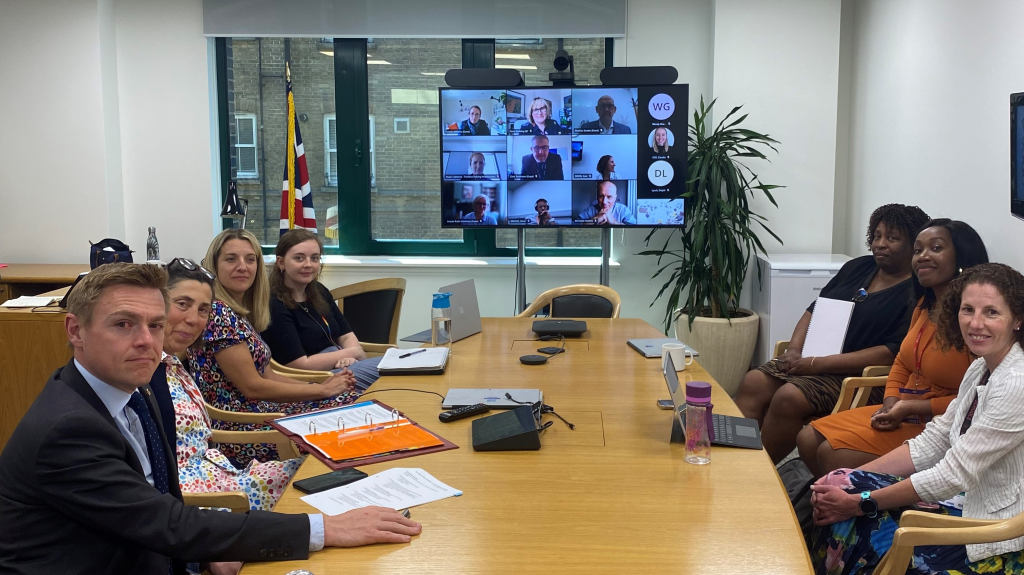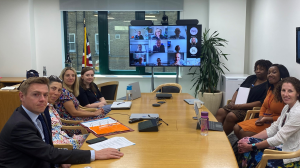
Today, I attended a roundtable at the Department for Education to speak about children’s views and experiences of racism. This was following the shocking and appalling case of Child Q, a 15 year-old girl who was strip-searched by the police at her school. We discussed what needs to change so that lessons are learned from this girl’s experience and that it never happens again.
I have written to the Metropolitan Police to express my grave concerns about this case and the culture that led to it; you can read my initial statement here. I have also committed my office to an inquiry into children’s experience of policing, which you can read about in this year’s Business Plan.
The roundtable was hosted by Will Quince MP, the Minister for Children and Families, and Baroness Barran, the Minister for the School System. In attendance were researchers and stakeholders from the police, education, the legal profession, local authorities and the voluntary sector. Also attending were officials from Ofsted, the Department for Education, the Cabinet Office, and the Government Equalities Office.
The discussion covered what action has been taken since the Child Q report, the issue of racism in schools, adultification and its impact on children, as well as exploring the practice of policing in schools.
As Children’s Commissioner, listening to children and young people goes to the heart of my role. I was therefore pleased to be able to contribute what children told us in The Big Ask about their experience of racism, particularly in schools, and to lead the discussion on the prevalence of racism, its impact on children and the solutions we should be working towards.
The Big Ask, which I conducted last year, is the largest-ever survey of children in England with almost half a million responses, from children of all backgrounds.
The Big Ask shows us that the vast majority of children in England are happy with their lives. Some children, however, expressed frustration about race and discrimination in school and in wider society. For many children, the experience of discrimination is very real.
Some children talked about their experience of racism in relation to policing. As one 15 year old from a Black, Asian, or minority ethnic background said:
“Racism and discrimination because it makes me feel like an outsider [and] police brutality especially towards black people” – Girl, 15, BAME.
Children also spoke about racism within education. While the vast majority of children responding were very positive about school, a worrying minority expressed concerns about how they would be treated at school, by their peers or by teachers. A 13 year old told us:
“…[F]or children aged 12+ this is about racism. I have experienced quite a lot of racism in secondary school more than I ever had before in primary school or outside of school since I am a British Pakistani Muslim and because of my skin colour also because I wear a hijab at school. In the past year I have lost my best friend and I have drifted away from my other one. I have experienced racism in school. So I think putting other people down just because of their race disappoints people a lot.” – Girl, 13.
Children are particularly worried about the potential impacts of stereotypes and discrimination on their future after school. Children often identified racism as a barrier to progress – both through the attitudes of others towards them, and through a lack of equal access to resources and opportunities. These comments could be very personal. As one girl said:
“I am scared as I come from a single parent home and I am black; I see my mum working very hard but she is treated with racism but she just work as she have to provide for us. I work very hard in school, never had detention, but I feel worried that my colour will be looked at rather than my hard work […].” – Girl, 16.
This roundtable was an important forum to speak about the shocking and appalling case of Child Q and children’s wider experiences of racism, and to ensure that the right lessons are learnt.
I have recommended that schools and colleges – within a strong family of schools – need to provide more comprehensive pastoral support for children with additional needs, including those who might start to miss school or become involved with the police. Where additional support is needed, it must be provided easily, quickly, to every child, every time, with no additional barriers or racial disparities.
I have been calling for schools to become full members of local safeguarding partnerships, with the powers and responsibilities that come with this role, and I am pleased to see progress on this area. We need schools and the police to collectively take up their responsibilities to treat all children as children – and to keep them safe.
Child Q’s experience must never be repeated and so we need to listen to children and ensure that the right lessons are learned across the police and our education and care systems.






